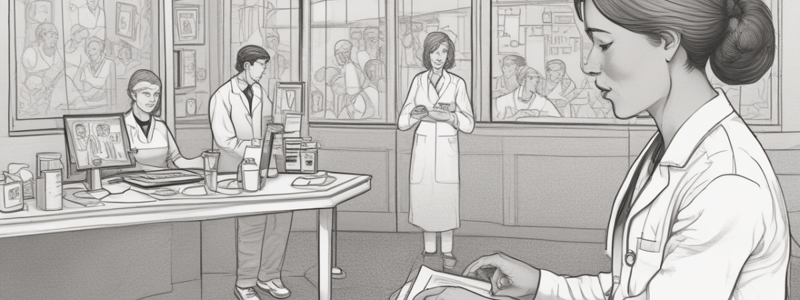Podcast
Questions and Answers
What is a characteristic of competent communication in nursing practice?
What is a characteristic of competent communication in nursing practice?
- It only focuses on clinical standards of care
- It maintains effective relationships within the entire sphere of professional practice (correct)
- It ignores ethical standards of care
- It is a one-time learning process
What is at the core of nursing?
What is at the core of nursing?
- Clinical judgment
- Critical thinking
- Caring relationships (correct)
- Therapeutic communication
What is essential for nurses to develop in order to become the best communicators?
What is essential for nurses to develop in order to become the best communicators?
- Communication skills only
- Empathy only
- Clinical experience only
- Critical thinking skills and clinical judgment (correct)
What can critical thinking help nurses to overcome during patient interactions?
What can critical thinking help nurses to overcome during patient interactions?
Why is communication a lifelong learning process in nursing?
Why is communication a lifelong learning process in nursing?
What type of relationship occurs between a nurse and patient during therapeutic communication?
What type of relationship occurs between a nurse and patient during therapeutic communication?
What is the primary goal of motivational interviewing in professional nursing relationships?
What is the primary goal of motivational interviewing in professional nursing relationships?
What is a key aspect of interpersonal communication in nursing?
What is a key aspect of interpersonal communication in nursing?
Which of the following is NOT a characteristic of verbal communication?
Which of the following is NOT a characteristic of verbal communication?
What is a benefit of critical thinking in communication?
What is a benefit of critical thinking in communication?
What is a key element of caring relationships in nursing?
What is a key element of caring relationships in nursing?
What is the primary function of feedback in the circular transactional model of communication?
What is the primary function of feedback in the circular transactional model of communication?
Which of the following is an example of a nontherapeutic communication technique?
Which of the following is an example of a nontherapeutic communication technique?
Why is effective communication essential in nursing practice?
Why is effective communication essential in nursing practice?
What is the primary focus of the nursing process in patient care?
What is the primary focus of the nursing process in patient care?
Which of the following is an example of a small-group communication level?
Which of the following is an example of a small-group communication level?
What is the primary goal of therapeutic communication in nursing practice?
What is the primary goal of therapeutic communication in nursing practice?
Which of the following is an example of a metacommunication skill?
Which of the following is an example of a metacommunication skill?
What is the primary benefit of using courtesy in professional nursing relationships?
What is the primary benefit of using courtesy in professional nursing relationships?
Which of the following is a sociocultural consideration in communication?
Which of the following is a sociocultural consideration in communication?
Flashcards are hidden until you start studying
Study Notes
Communication and Nursing Practice
- Communication is a lifelong learning process that maintains effective relationships within the entire sphere of professional practice, meeting legal, ethical, and clinical standards of care.
- Caring relationships are at the core of nursing, and being able to relate to others is important for interpersonal communication.
- Therapeutic communication occurs within a healing relationship between a nurse and patient.
Developing Communication Skills
- Nurses who develop critical thinking skills and clinical judgment make the best communicators.
- Critical thinking helps to overcome perceptual biases or stereotypes that interfere with accurately perceiving and interpreting messages from others.
Levels of Communication
- Intrapersonal communication
- Interpersonal communication
- Small-group communication
- Public communication
- Electronic communication
Elements of the Communication Process
- Circular transactional model
- Referent
- Sender and receiver
- Message
- Channels
- Feedback
- Interpersonal values
- Environment
Forms of Communication
Verbal Communication
- Vocabulary
- Denotative and connotative meaning
- Pacing
- Intonation
- Clarity and brevity
- Timing and relevance
Nonverbal Communication
- Personal appearance
- Posture and gait
- Facial expression
- Eye contact
- Gestures
- Sounds
- Territoriality and personal space
- Metacommunication
Professional Nursing Relationships
- Nurse-patient caring relationships
- Motivational interviewing
- Nurse-family relationships
- Nurse-health care team relationships
- Lateral violence
- Nurse-community relationships
Elements of Professional Communication
- Courtesy
- Use of names
- Trustworthiness
- Autonomy and responsibility
- Assertiveness
Nursing Process
Assessment
- Through the patient's eyes
- Environmental factors
- Physical and emotional factors
- Gender
- Developmental factors
Analysis and Nursing Diagnosis
- Planning and outcomes identification
- Outcomes
- Setting priorities
- Teamwork and collaboration
Therapeutic Communication Techniques
- Active listening
- Clarifying
- Sharing observations
- Focusing
- Sharing empathy
- Paraphrasing
- Sharing hope
- Validation
- Sharing humor
- Asking relevant questions
- Sharing feelings
- Using touch
- Using silence
- Self-disclosure
- Confrontation
- Providing information
Nontherapeutic Communication Techniques
- Asking personal questions
- Asking for explanations
- Giving personal opinions
- Changing the subject
- Defensive responses
- Automatic responses
- False reassurance
- Sympathy
- Arguing
Special Communication Considerations
- Sociocultural considerations: culture influences thinking, feeling, behaving, and communicating.
Studying That Suits You
Use AI to generate personalized quizzes and flashcards to suit your learning preferences.




